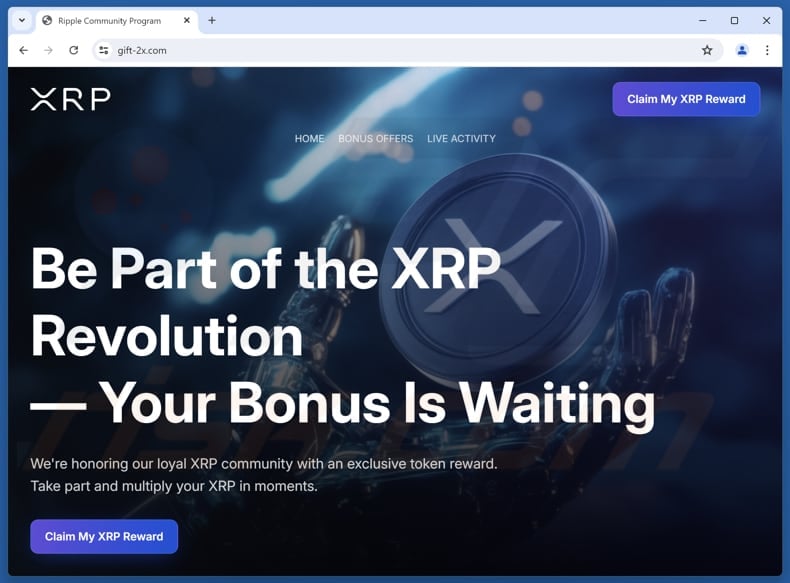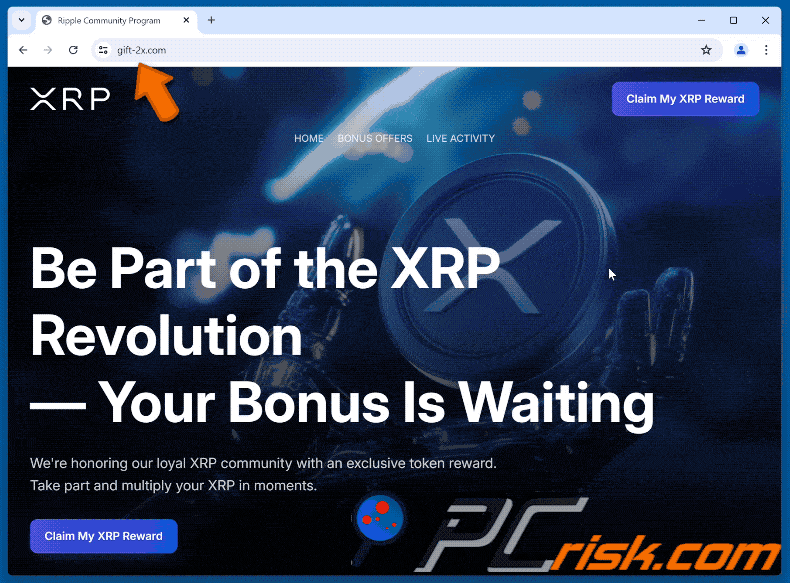How to spot scams like "Ripple (XRP) Rewards Scam"
Phishing/ScamAlso Known As: Fake Ripple (XRP) Rewards website
Get free scan and check if your device is infected.
Remove it nowTo use full-featured product, you have to purchase a license for Combo Cleaner. Seven days free trial available. Combo Cleaner is owned and operated by RCS LT, the parent company of PCRisk.com.
What is the "Ripple (XRP) Rewards" scam?
Our analysis of the site (gift-2x[.]com) shows that it is designed to steal cryptocurrency. The page offers an "exclusive token reward" as a lure. Falling for this scam can result in financial losses. Thus, users should be careful when encountering such pages and verify their legitimacy before taking action.

"Ripple (XRP) Rewards" scam in detail
This scam promotes a fake special XRP token giveaway to reward loyal community members. It asks users to send XRP to a participation wallet and promises to double their tokens plus extra bonuses. The more XRP sent, the bigger the supposed reward. However, these claims are fake — once users send their crypto, it is stolen, and they receive nothing back.
The scam takes advantage of Ripple’s well-known name to seem trustworthy. Ripple is a legitimate technology company known for its digital payment protocol and cryptocurrency, XRP. The company has nothing to do with this scam website. It is also important to note that, in most cases, stolen cryptocurrency cannot be recovered.
Crypto transactions are usually irreversible and recorded on a public blockchain, making it nearly impossible to undo or reverse transfers. Thus, users should always examine crypto-related websites before sending cryptocurrency, connecting wallets, disclosing personal information, or taking other actions to avoid monetary loss, or other issues.
| Name | Fake Ripple (XRP) Rewards website |
| Threat Type | Scam, Social Engineering, Fraud |
| Fake Claim | Participants can double their cryptocurrency |
| Disguise | Legitimate XRP giveaway |
| Related Domain | gift-2x[.]com |
| Detection Names (gift-2x[.]com) | N/A (VirusTotal) |
| Wallet Address | rwQs74TqcJo9nGroddeqCeBWa8JWiHzVh6 |
| Symptoms | Unofficial domain, lack of official verification, unrealistic claims, too good-to-be-true promises |
| Distribution methods | Fake social media accounts, deceptive websites, rogue online advertisements |
| Damage | Cryptocurrency theft |
| Malware Removal (Windows) |
To eliminate possible malware infections, scan your computer with legitimate antivirus software. Our security researchers recommend using Combo Cleaner. Download Combo CleanerTo use full-featured product, you have to purchase a license for Combo Cleaner. 7 days free trial available. Combo Cleaner is owned and operated by RCS LT, the parent company of PCRisk.com. |
Similar scams in general
Scams of this type often promise unrealistic returns or giveaways to lure victims into sending cryptocurrency or personal information. They use the names of well-known companies or other entities (or individuals) to appear legitimate. Ultimately, these schemes are designed to steal funds, and once sent, the money is rarely recoverable.
Some examples of other crypto-related scams are "Flare Time Series Oracle (FTSO) Reward Scam", "Ethereum (ETH) Rewards Scam", and "Jupiter (JUP) Rewards Scam".
How did I open a scam website?
Scammers can spread their schemes using different deceptive methods. They impersonate reputable people, companies, or organizations by using fake or compromised social media accounts on platforms like Facebook or X (formerly Twitter) or by compromising legitimate websites (or using deceptive ones).
They also send fraudulent emails or place fake ads on suspicious websites to trick users into clicking harmful links that lead to scam pages. Additionally, users can be directed to these fraudulent sites through rogue ad networks often found on torrent sites, adult content pages, or illegal streaming platforms.
How to avoid visiting scam pages?
Always exercise caution with unexpected or suspicious messages (including emails) from unknown sources—only open attachments or click links if you are confident they are not malicious. Avoid engaging with pop-ups, ads, or links on untrusted or unofficial websites. Keep your operating system and apps up to date.
Decline notification requests from questionable web pages and regularly scan your device with reputable antivirus or security software to detect and eliminate potential threats. If your computer is already infected with unwanted apps, we recommend running a scan with Combo Cleaner Antivirus for Windows to automatically eliminate them.
The appearance of "Ripple (XRP) Rewards" scam (GIF):

Instant automatic malware removal:
Manual threat removal might be a lengthy and complicated process that requires advanced IT skills. Combo Cleaner is a professional automatic malware removal tool that is recommended to get rid of malware. Download it by clicking the button below:
DOWNLOAD Combo CleanerBy downloading any software listed on this website you agree to our Privacy Policy and Terms of Use. To use full-featured product, you have to purchase a license for Combo Cleaner. 7 days free trial available. Combo Cleaner is owned and operated by RCS LT, the parent company of PCRisk.com.
Quick menu:
- What is Fake Ripple (XRP) Rewards website?
- How to identify a pop-up scam?
- How do pop-up scams work?
- How to remove fake pop-ups?
- How to prevent fake pop-ups?
- What to do if you fell for a pop-up scam?
How to identify a pop-up scam?
Pop-up windows with various fake messages are a common type of lures cybercriminals use. They collect sensitive personal data, trick Internet users into calling fake tech support numbers, subscribe to useless online services, invest in shady cryptocurrency schemes, etc.
While in the majority of cases these pop-ups don't infect users' devices with malware, they can cause direct monetary loss or could result in identity theft.
Cybercriminals strive to create their rogue pop-up windows to look trustworthy, however, scams typically have the following characteristics:
- Spelling mistakes and non-professional images - Closely inspect the information displayed in a pop-up. Spelling mistakes and unprofessional images could be a sign of a scam.
- Sense of urgency - Countdown timer with a couple of minutes on it, asking you to enter your personal information or subscribe to some online service.
- Statements that you won something - If you haven't participated in a lottery, online competition, etc., and you see a pop-up window stating that you won.
- Computer or mobile device scan - A pop-up window that scans your device and informs of detected issues - is undoubtedly a scam; webpages cannot perform such actions.
- Exclusivity - Pop-up windows stating that only you are given secret access to a financial scheme that can quickly make you rich.
Example of a pop-up scam:

How do pop-up scams work?
Cybercriminals and deceptive marketers usually use various advertising networks, search engine poisoning techniques, and shady websites to generate traffic to their pop-ups. Users land on their online lures after clicking on fake download buttons, using a torrent website, or simply clicking on an Internet search engine result.
Based on users' location and device information, they are presented with a scam pop-up. Lures presented in such pop-ups range from get-rich-quick schemes to fake virus scans.
How to remove fake pop-ups?
In most cases, pop-up scams do not infect users' devices with malware. If you encountered a scam pop-up, simply closing it should be enough. In some cases scam, pop-ups may be hard to close; in such cases - close your Internet browser and restart it.
In extremely rare cases, you might need to reset your Internet browser. For this, use our instructions explaining how to reset Internet browser settings.
How to prevent fake pop-ups?
To prevent seeing pop-up scams, you should visit only reputable websites. Torrent, Crack, free online movie streaming, YouTube video download, and other websites of similar reputation commonly redirect Internet users to pop-up scams.
To minimize the risk of encountering pop-up scams, you should keep your Internet browsers up-to-date and use reputable anti-malware application. For this purpose, we recommend Combo Cleaner Antivirus for Windows.
What to do if you fell for a pop-up scam?
This depends on the type of scam that you fell for. Most commonly, pop-up scams try to trick users into sending money, giving away personal information, or giving access to one's device.
- If you sent money to scammers: You should contact your financial institution and explain that you were scammed. If informed promptly, there's a chance to get your money back.
- If you gave away your personal information: You should change your passwords and enable two-factor authentication in all online services that you use. Visit Federal Trade Commission to report identity theft and get personalized recovery steps.
- If you let scammers connect to your device: You should scan your computer with reputable anti-malware (we recommend Combo Cleaner Antivirus for Windows) - cyber criminals could have planted trojans, keyloggers, and other malware, don't use your computer until removing possible threats.
- Help other Internet users: report Internet scams to Federal Trade Commission.
Frequently Asked Questions (FAQ)
What is a fake crypto giveaway?
A fake crypto giveaway is a scam where fraudsters pretend to offer free cryptocurrency to users, often claiming to double any crypto sent to them.
What is the purpose of a fake crypto giveaway?
Scammers use these schemes to steal crypto funds from victims,
Why do I encounter scam websites?
Scammers use various methods to spread their schemes, such as impersonating trusted people or companies through fake social media accounts. They also send fake emails and use misleading ads to lure users into clicking harmful links. Scam sites can also be promoted through rogue ad networks on torrent, adult content, illegal streaming websites, and similar sites.
Will Combo Cleaner protect me from scams?
Combo Cleaner checks the websites users browse, detects harmful or fraudulent pages, and promptly notifies them. It also blocks access to these risky sites to protect against scams, data theft, and other threats.
Share:

Tomas Meskauskas
Expert security researcher, professional malware analyst
I am passionate about computer security and technology. I have an experience of over 10 years working in various companies related to computer technical issue solving and Internet security. I have been working as an author and editor for pcrisk.com since 2010. Follow me on Twitter and LinkedIn to stay informed about the latest online security threats.
PCrisk security portal is brought by a company RCS LT.
Joined forces of security researchers help educate computer users about the latest online security threats. More information about the company RCS LT.
Our malware removal guides are free. However, if you want to support us you can send us a donation.
DonatePCrisk security portal is brought by a company RCS LT.
Joined forces of security researchers help educate computer users about the latest online security threats. More information about the company RCS LT.
Our malware removal guides are free. However, if you want to support us you can send us a donation.
Donate
▼ Show Discussion